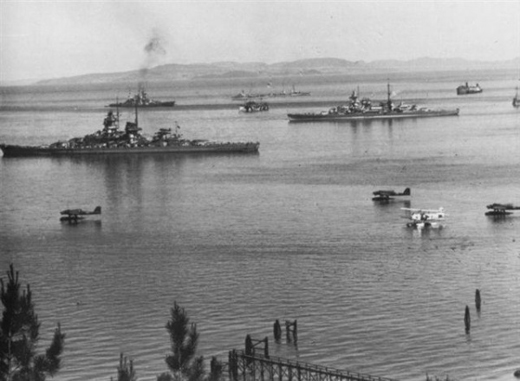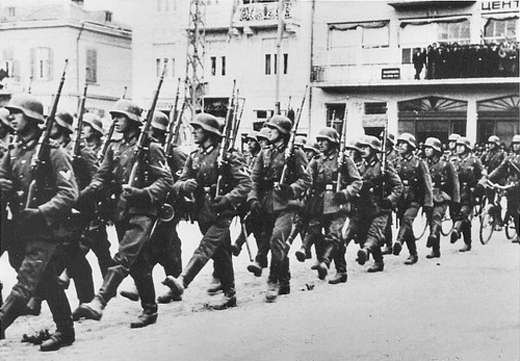Air Operations, East Africa
The first RAF bombing raids on Italian airfields in East Africa cause great damage.
[Air Operations, Europe
During the night 36 Whitleys take off to bomb Turin and Genoa after a refuelling stop in the Channel Islands. 23 bombers have to abort because of extremely bad weather, 10 drop bombs on Turin's Fiat works or alternate targets in the city, 2 stike Genoa and 1 is lost. French authorities at Marseilles prevent Wellingtons from taking off to bomb targets in northern Italy by blocking the runway with trucks (they fear Italian 'reprisal' raids).
[Air Operations, Mediterranean
There are 2 Italian raids on Malta; 35 civilians and 6 British soldiers are killed.
[Air Operations, North Africa
The first RAF bombing raids on Italian airfields in Libya cause great damage. A total of 3 aircraft are lost.
[Battle of the Atlantic
- The British troopship Bruges (2949t) is sunk by German bombing off Le Havre. 72 men are rescued from the troopship. Other ships sunk by German bombing at or near Le Havre include the French steamers General Metzinger (9345t), Niobe (1684t) and Syrie (2460t), the Belgian steamers Albertville (11047t) and Piriapolis (7347t) and the Norwegian steamer Ellavore (1302t).
- U-48 sinks the Greek steamer Violando N Goulandris (3598t) north northwest of Cape Finisterre with the loss of 6 crewmen.
- U-101 sinks the Greek steamer Mount Hymettus (5820t) off the coast of Portugal Her entire crew of 24 are rescued.
- The British steamer St Ronaig (509t) sinks on a mine 1 mile from West Breakwater Light, Newhaven. 2 of the crew are killed, 2 are missing and 4 are rescued.
German Warships at Trondheim |
 |
Britain, Home Front
Clement Attlee, Lord Privy Seal, denounces Mussolini's declaration of war, comparing him with 'the jackal' which scents the possibility of getting some scraps from another beast's kill!
[Diplomatic Relations
- Australia, New Zealand and South Africa declare war on Italy.
- Churchill, meeting the French government in their new headquarters at Tours, is unable to generate the same fighting spirit there that he is instilling at home. He steadfastly refuses to send RAF squadrons to France, knowing that doing so would reduce his own country's chances of survival. It brings to an end RAF sorties from bases in southern France.
Dutch Royalty Sail to Canada |
 |
Mediterranean
- The first actions of the war in this theater are some air skirmishes in North Africa and over Malta. The British Mediterranean Fleet and a French cruiser squadron sweep the eastern Mediterranean and the Aegean for Italian shipping. British cruisers bombard Tobruk and the cruiser Calypso is sunk south of Crete by the Italian submarine Bagnolini. 1 officer and 38 sailors are lost.
- The Greek steamers Zinovia (2975t) Makis (3546t) sink on mines 15-20 miles north of Pantellaria Island. 2 of the crew of the Zinovia are lost and the entire crew of the Makis are rescued.
United States, Politics
Congress passes the National Supply Act giving $1.5 billion to the US Navy.
[Western Front
Most of what remains of the French forces are retreating in confusion south of the Seine and Marne. The German tank forces take Rheims. German vanguards approach Pontoise, threatening Paris from the northwest.
The situation of the French army is now as follows: of the 30 divisions that still exist on paper, 11 possess more that 50 per cent of their effectives, 13 are reduced to 25 per cent, and the rest are no more than 'remnants'.
The military governor of Paris, Gen Pierre Hering, declares Paris an open city. This accords with the decision by Gen Weygand that Paris, already surrounded by the enemy to the east and west, cannot be defended. The Germans, for their part, announce by radio that if they are to recognize Paris as an open city they require the cessation of all French military resistance north of a line Saint-Germain-Versailles-Juvisy-Saint-Maur-Meaux. The French accept this condition and the Parisians rejoice to learn that their city is to be spared.
The French government decamps from Paris to Tours.[MORE]
German Soldiers in Paris |
 |